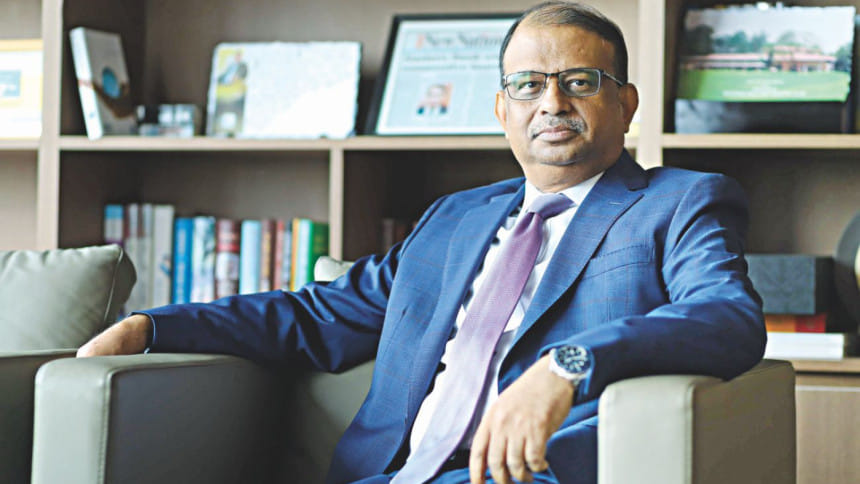EBL getting ready to fund big projects

At a time when most lenders are battling liquidity crisis, rising default loans and poor governance, Eastern Bank Limited (EBL) is sitting pretty by all accounts.
Its net profit last year stood at Tk 308 crore, up 28.10 percent year-on-year. It paid 30 percent dividend, including 10 percent bonus shares, to its shareholders, and yet retained earnings to consolidate its capital base.
Its default loans account for only 2.35 percent of the outstanding loans, which is below the industry average of 10.30 percent.

"We have never gone for aggressive lending," Ali Reza Iftekhar, managing director and chief executive officer of EBL, told The Daily Star in an interview recently.
The bank is very selective in giving out loans: corporate loans make up two-thirds of its loan portfolio and yet the number of corporate clients is not high.
This stance has not only paid off for EBL; it has put the lender in good stead for financing mega projects such as the Dohazari-Cox's Bazar rail line and Rooppur nuclear power plant.
In power and energy, EBL has supported a number of projects that have the capacity of generating more than 2,100MW electricity, according to Iftekhar.
The bank is the undisputed leader in aviation financing: it has so far provided $192 million to clients, including Biman Bangladesh Airlines, to buy 12 aircraft.
The reason for the bank's intrepid lending activities is that a number of its employees had taken credit assessment training from global institutes, said Iftekhar, who joined EBL in 2004 as a deputy managing director and was elevated to the top position in 2007.
"We think skilled human resource is pivotal."
Now, the bank is shifting towards retail and SME banking from its heavy reliance on corporate banking, which now makes up about 28 percent of its loan portfolio.
"We have given strong priority to retail banking, but not that at the cost of corporate lending," Iftekhar said.
Regardless, in retail banking, EBL is already a market leader. The Singapore-based Asian Banker had adjudged EBL the best retail bank in Bangladesh for six consecutive years starting from 2013 to 2018.
Lending under its retail banking grew 9 percent year-on-year to Tk 4,359 crore last year.
Iftekhar thinks mortgage loans have a huge prospect in Bangladesh given the rising purchasing power of people brought about by the economy's solid growth in the past decade.
"People should be given tax incentive to buy homes with bank loans."
The bank, which handled about 4 percent of the country's external trade worth over $90 billion last year, has also set its sights on regional domination.
It will open a representative office in China's Guangzhou and a full branch in Kolkata, India to cater to the needs of traders of Bangladesh's top two trading partners.
As part of the move, EBL will open a dedicated China desk within a month to serve the growing Chinese investors in the country.
The experienced banker also talked about the recent move by the central bank to reschedule bad loans. He believes that no wilful defaulter should get the chance.
"It is not a blanket facility for all defaulters. Rescheduling of loans will entirely depend on the bank-customer relationship."
Iftekhar says default loans and liquidity issues will continue to pose challenges for the banking sector, but banks will have to be prepared to face them.
"Weak banks should get merged and others should not go for aggressive lending. A bank is not a shop; its business progresses slowly," he said, adding that more than 90 percent of a bank's money comes from people and not from shareholders.
EBL is the first bank in Bangladesh to be rated by global credit ratings giant Moody's Investor Service.
Asia Money has also awarded the bank several times. It has also got recognitions from local authorities for its tremendous performance.
"EBL has got more awards than any other banks in Bangladesh and it reflects our professionalism, prudence, and growth," Iftekhar said.
The bank's success was full of struggle since its inception in 1992 from the ashes of the then-collapsed BCCI (Bank of Credit and Commerce International).
The bank was restructured as per the guidelines of the central bank and some depositors of BCCI got shares in the new bank and became directors.
Since then the bank has been getting restructured with continuous improvement in corporate governance and customer relationship.
Its hunger to improve remains intact.
For instance, one of its core goals is to make its low default loan ratio even smaller: it wants to bring the ratio down to less than 2 percent within the next two years.
"The bank has laid emphasis on recovery," he said.
Even after running a tight ship EBL remains susceptible to large defaults: business groups take loans from different banks and failure to pay back one bank sets off a chain reaction.
"If one of them becomes defaulter with one bank, the others will have to face difficulties in managing the situation," Iftekhar said.
Inadequate capital will create problems for banks and make them unable to implement the norms of the Basel III within this year as per an instruction of the central bank, according to the EBL CEO.
As of December last year, EBL's capital adequacy ratio against its risk-weighted assets stood at 12.24 percent, well above the market average of 10.50 percent.
The bank's earnings per share also rose to Tk 4.17 last year from Tk 3.26 a year earlier.

 For all latest news, follow The Daily Star's Google News channel.
For all latest news, follow The Daily Star's Google News channel. 






Comments